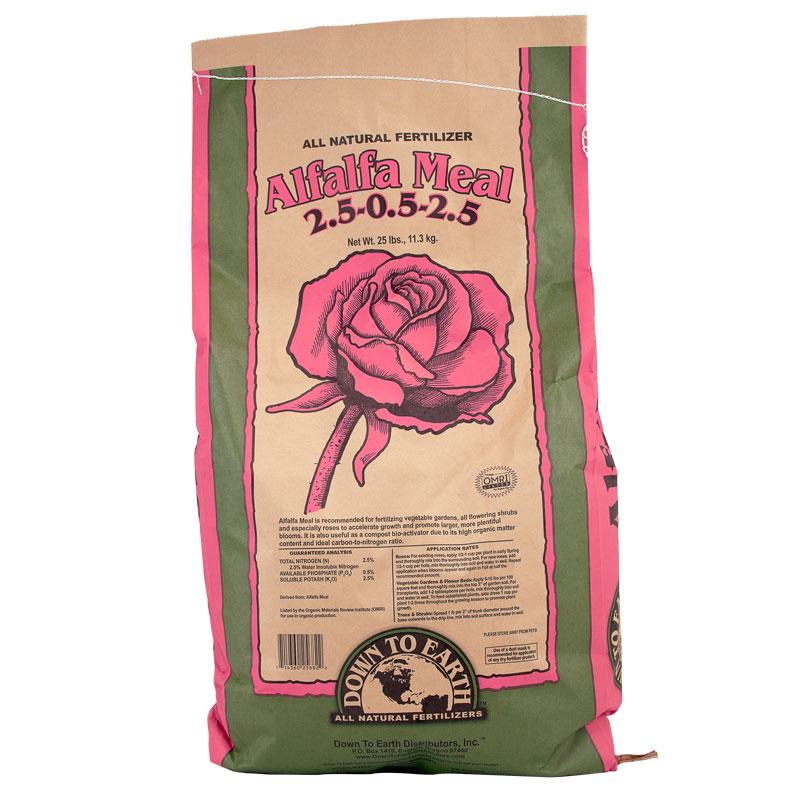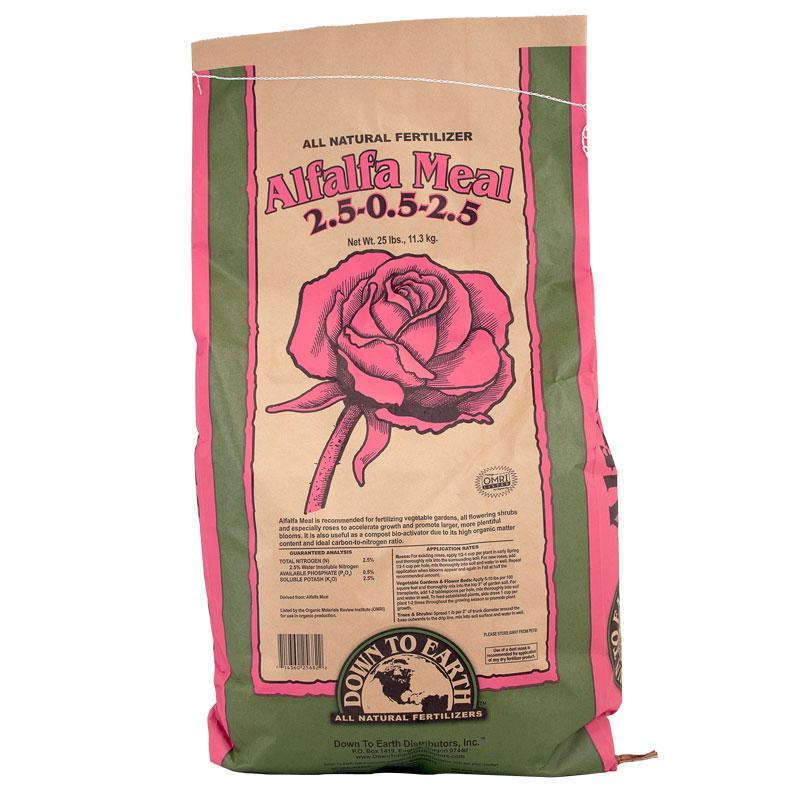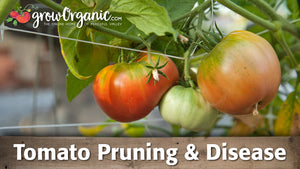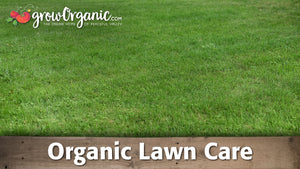Item Number: F033
Alfalfa Meal (25 lb Bag)
Alfalfa Meal (25 lb Bag)
Feed Your Roses or Your Compost Pile
Derived from leguminous perennial alfalfa plant used for pasture and cover crop. Primary benefit of this pleasant smelling meal is increasing organic matter, although it is also a valuable plant-derived fertilizer.
- Excellent addition to the compost pile for nitrogen content and absorbency.
- Roses respond especially well to alfalfa meal. For new plantings of roses, mix 0.5 cup per plant into the soil.
- For existing plants, mix 0.5-1 cup of alfalfa meal to a depth of 4"-6" around each rose bush.
- For vegetables and flower beds, work in at 2-5 lbs/100 sq ft.
- 2.5% N, 0.5% P, 2.5%K
Alfalfa meal, derived from the leguminous perennial plant known as alfalfa (Medicago sativa), is a popular and versatile soil amendment used by gardeners to boost soil fertility and nurture healthy, robust plants. This organic product has been valued in agriculture for centuries and continues to be a go-to choice for both home gardeners and commercial growers. In this guide, we will explore the benefits, uses, and application methods of alfalfa meal.
The Benefits of Alfalfa Meal:
Nutrient-Rich: Alfalfa meal is a natural source of essential plant nutrients, including nitrogen, phosphorus, and potassium (N-P-K). It also contains various trace minerals, making it a well-rounded fertilizer.
Improves Soil Structure: When incorporated into the soil, alfalfa meal helps improve soil structure by enhancing its aeration and water-holding capacity. This results in better root development and nutrient absorption by plants.
Rich in Organic Matter: Alfalfa meal is an excellent source of organic matter, which enriches the soil and encourages the growth of beneficial soil microorganisms. This promotes a healthier and more vibrant soil ecosystem.
Promotes Microbial Activity: The organic content in alfalfa meal acts as a food source for beneficial soil bacteria and fungi. This boosts microbial activity, leading to improved nutrient cycling and overall soil health.
Balanced Nutrition: Alfalfa meal provides a balanced nutrient profile, making it suitable for a wide range of plants, including vegetables, flowers, and fruit trees.
Common Uses for Alfalfa Meal:
As a Fertilizer: Alfalfa meal serves as a natural and slow-release fertilizer. Its nutrient content, especially nitrogen, promotes healthy leafy growth in plants. It can be applied to the soil before planting or as a top dressing during the growing season.
In Composting: Adding alfalfa meal to your compost pile can accelerate decomposition, thanks to its nitrogen content. It also helps balance the carbon-to-nitrogen ratio in the compost, leading to the production of nutrient-rich compost.
Mulching: Spreading alfalfa meal as mulch around the base of plants provides both weed suppression and a slow-release source of nutrients. It gradually breaks down, feeding your plants throughout the growing season.
For Nitrogen Fixation: Leguminous cover crops, such as alfalfa, have the unique ability to fix atmospheric nitrogen into a form that plants can use. Growing alfalfa as a cover crop can enrich the soil with nitrogen, benefiting subsequent crops.
In Organic Gardening: Alfalfa meal is a favored choice among organic gardeners due to its natural composition and minimal environmental impact. It aligns with organic gardening principles and helps maintain soil health.
Application Tips:
Pre-Planting: When preparing your garden beds, incorporate alfalfa meal into the soil at a rate of 5-10 pounds per 100 square feet. Mix it thoroughly to ensure even distribution.
Top Dressing: For established plants, apply alfalfa meal as a top dressing around the base of the plant. Use 1-2 cups for small plants and up to 5 cups for larger ones.
Composting: When adding alfalfa meal to your compost pile, use 1-2 cups for every 25 square feet of compost.
Cover Cropping: When using alfalfa as a cover crop, sow seeds at the recommended rate for your specific region and follow cover cropping guidelines.
Mulching: Apply a thin layer of alfalfa meal as mulch around the base of plants, keeping it away from direct contact with stems or trunks.
Alfalfa meal is a valuable organic soil amendment that offers multiple benefits to gardeners. Whether you're looking to boost plant nutrition, improve soil structure, or enhance your compost, alfalfa meal is a versatile and eco-friendly choice that promotes healthy and thriving gardens. By incorporating this natural resource into your gardening practices, you'll be on your way to growing lush, vibrant plants and fostering a sustainable garden environment.

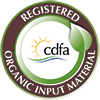

Check Your Zone Compatibility:
Compatible with your zone.
Growing Zone for
,

Our Guarantee To You
Since 1976, we've served our customers at every stage of growing. Please contact us at any time. We are happy to support and assist you.
Description
Description
Derived from leguminous perennial alfalfa plant used for pasture and cover crop. Primary benefit of this pleasant smelling meal is increasing organic matter, although it is also a valuable plant-derived fertilizer.
- Excellent addition to the compost pile for nitrogen content and absorbency.
- Roses respond especially well to alfalfa meal. For new plantings of roses, mix 0.5 cup per plant into the soil.
- For existing plants, mix 0.5-1 cup of alfalfa meal to a depth of 4"-6" around each rose bush.
- For vegetables and flower beds, work in at 2-5 lbs/100 sq ft.
- 2.5% N, 0.5% P, 2.5%K
Alfalfa meal, derived from the leguminous perennial plant known as alfalfa (Medicago sativa), is a popular and versatile soil amendment used by gardeners to boost soil fertility and nurture healthy, robust plants. This organic product has been valued in agriculture for centuries and continues to be a go-to choice for both home gardeners and commercial growers. In this guide, we will explore the benefits, uses, and application methods of alfalfa meal.
The Benefits of Alfalfa Meal:
Nutrient-Rich: Alfalfa meal is a natural source of essential plant nutrients, including nitrogen, phosphorus, and potassium (N-P-K). It also contains various trace minerals, making it a well-rounded fertilizer.
Improves Soil Structure: When incorporated into the soil, alfalfa meal helps improve soil structure by enhancing its aeration and water-holding capacity. This results in better root development and nutrient absorption by plants.
Rich in Organic Matter: Alfalfa meal is an excellent source of organic matter, which enriches the soil and encourages the growth of beneficial soil microorganisms. This promotes a healthier and more vibrant soil ecosystem.
Promotes Microbial Activity: The organic content in alfalfa meal acts as a food source for beneficial soil bacteria and fungi. This boosts microbial activity, leading to improved nutrient cycling and overall soil health.
Balanced Nutrition: Alfalfa meal provides a balanced nutrient profile, making it suitable for a wide range of plants, including vegetables, flowers, and fruit trees.
Common Uses for Alfalfa Meal:
As a Fertilizer: Alfalfa meal serves as a natural and slow-release fertilizer. Its nutrient content, especially nitrogen, promotes healthy leafy growth in plants. It can be applied to the soil before planting or as a top dressing during the growing season.
In Composting: Adding alfalfa meal to your compost pile can accelerate decomposition, thanks to its nitrogen content. It also helps balance the carbon-to-nitrogen ratio in the compost, leading to the production of nutrient-rich compost.
Mulching: Spreading alfalfa meal as mulch around the base of plants provides both weed suppression and a slow-release source of nutrients. It gradually breaks down, feeding your plants throughout the growing season.
For Nitrogen Fixation: Leguminous cover crops, such as alfalfa, have the unique ability to fix atmospheric nitrogen into a form that plants can use. Growing alfalfa as a cover crop can enrich the soil with nitrogen, benefiting subsequent crops.
In Organic Gardening: Alfalfa meal is a favored choice among organic gardeners due to its natural composition and minimal environmental impact. It aligns with organic gardening principles and helps maintain soil health.
Application Tips:
Pre-Planting: When preparing your garden beds, incorporate alfalfa meal into the soil at a rate of 5-10 pounds per 100 square feet. Mix it thoroughly to ensure even distribution.
Top Dressing: For established plants, apply alfalfa meal as a top dressing around the base of the plant. Use 1-2 cups for small plants and up to 5 cups for larger ones.
Composting: When adding alfalfa meal to your compost pile, use 1-2 cups for every 25 square feet of compost.
Cover Cropping: When using alfalfa as a cover crop, sow seeds at the recommended rate for your specific region and follow cover cropping guidelines.
Mulching: Apply a thin layer of alfalfa meal as mulch around the base of plants, keeping it away from direct contact with stems or trunks.
Alfalfa meal is a valuable organic soil amendment that offers multiple benefits to gardeners. Whether you're looking to boost plant nutrition, improve soil structure, or enhance your compost, alfalfa meal is a versatile and eco-friendly choice that promotes healthy and thriving gardens. By incorporating this natural resource into your gardening practices, you'll be on your way to growing lush, vibrant plants and fostering a sustainable garden environment.
Shipping Information
Shipping Information
Shipping Weight: 25.5 lb
Dimensions: 12.5"L x 12.5"W x 12.5"H
Features
Features
Characteristics
Characteristics
Use Instructions
Use Instructions
Useful Information
Useful Information
Guarantee
Guarantee
Share
